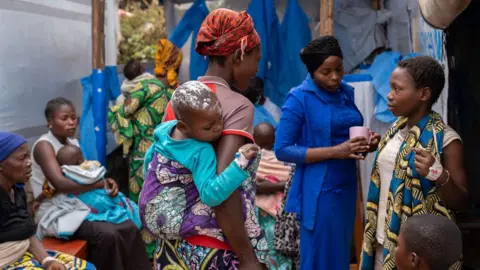The children bearing the brunt of the mpox outbreak
_90iQpC0VUV_pbeweo6maj9tihts33bwtcwvqjrurtjofmfbgeht0ix6vlblcitjdmtux23j_rRrNlW5DpP_zzaxuiwtneeywvhlwpygyqbbpreqvbztq1omnenv1lrzyz5nnicwxh4xsgey.png)
Goma- “It began like a small, inflamed spot. The mother squeezed it and watery discharge came out. Then another developed, and after a short period, they were all over the body,” says Alain Matabaro, describing how mpox developed in his six-year-old son Amani.
He started recovering after four days of treatment at a clinic in Munigi, close to the major eastern Congolese city of Goma.
Some 75% of the cases being seen by medics there are under the age of 10, according to Dr Pierre-Olivier Ngadjole who works for the charity Medair.
Young people seem to be particularly badly affected by the mpox outbreak because of their less developed immune systems.
Dr Ngadjole also blames overcrowding at a nearby camp set up for people forced from their homes by conflict in the region. One way mpox is spread is through very close contact and children “are always playing together. They don’t really care about social distance,” he tells the BBC.
“You can also see in the households, they even spend the night in the same bed. You can find three, four, five children. The transmission is present on a daily basis.”
Since June, the clinic in Munigi, which provides free treatment including antibiotics to treat skin infections, paracetamol and safe drinking water, has dealt with 310 mpox cases. It is now seeing between five and 10 new admissions each day.
No-one has died from the disease there and Dr Ngadjole believes it is because people are seeking help early.
“I think it’s very important to provide free health services especially in this context… [It] means people don’t face any financial barrier, they come early to the health facility.”
- 'Mpox made my throat so painful I couldn’t sleep'
- How worried should we be about mpox?
- What is mpox and how is it spread?
It is a different story 80km (50 miles) south-west of Munigi, on the other side of Lake Kivu, at a hospital in Kavumu.
Eight-hundred patients have been seen there since June and eight have died – all under the age of five.
 Glody Murhabazi
Glody Murhabazi
Officials at the hospital in Kavumu say finding enough space for everyone is a big challenge Two-year-old Ansima Kanigo caught mpox from one of her four siblings, who have all had the disease. Her mother, Nzigire Kanigo, 35, had no idea what it was at first.
"This is the first time I've seen it. When my child got sick, the other parents told me it might be measles, but we started treating measles and failed, so we decided to come here.
“God bless the doctor who has brought the drugs… Three [children] are cured - they are at home. I only have two who I am admitted with now in this hospital. I thank God.”
The medical director at the hospital, Dr Robert Musole, says the outbreak should not be underestimated by the authorities.
“The situation is really serious, and we're so overwhelmed, because we have a small capacity, but we're in great demand.
“The first challenge we face in this response is the accommodation of patients. The second challenge is the availability of medicines, which we don't have.”
Across eastern DR Congo, there are several camps for the millions who have fled their homes as various rebel groups operate in the area.
People are often crammed into makeshift structures and living in poor conditions without good sanitation - the perfect place for mpox to run rampant.
Source: BBC

Election Roadshow

41 killed, 12 rescued after boat capsizes in NW Nigeria: official
_Tce5QlMl8J_e9eft0xea8kg8tiiszpkjr0p1pmdtsvjz97goz2mntatyqkphfyf3otizmo7_AaMVPpql80_ydvwi8zkimpcwdzsmzfbm1sx7efuwlmwplnwvpeuzqevrxiiuraklsc5c5vw.jpg)
Iran sends Chamran-1 research satellite into orbit

Jordan PM resigns after general election

Modi 3.0 prioritizes science, technology, and security with landmark ini…

Election Commission consults PM Oli on by-election at local level

'We want identity and respect as human,' cry out sexual and gender minor…






Comment